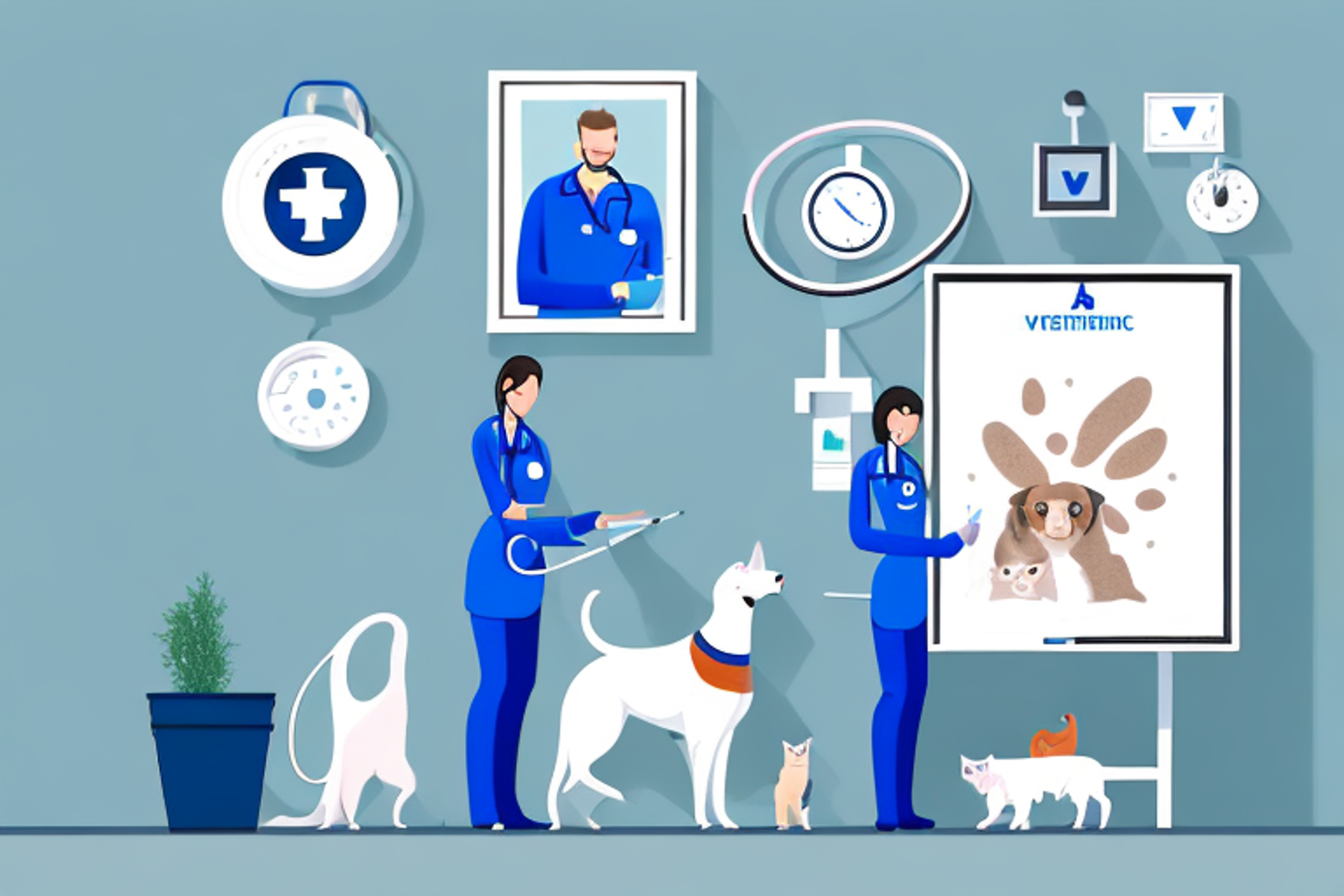How to Become a Veterinarian: Education, Licensing, and Career Options
Discover the steps to becoming a veterinarian, from the necessary education and licensing requirements to the various career options available.
Posted June 13, 2025

Table of Contents
If you are an animal lover who wants to pursue a career in veterinary medicine, there are many educational, licensing, and career options to consider. Becoming a veterinarian requires a significant investment of time, money, and effort, but the rewards are well worth it. In this article, we will explore all the options available to you in your journey to becoming a veterinarian.
The Importance of Choosing the Right College or University for your Veterinary Degree
The first and most crucial step in becoming a veterinarian is choosing the right college or university for your degree. This choice will significantly impact your education, career opportunities, and earning potential. There are over 30 accredited veterinary schools in the United States, each with its admission standards and curriculum. Researching each program, speaking with current students and faculty, and visiting the campus to get a feel for the environment are all crucial steps to ensure you make an informed decision when selecting a program.
One important factor to consider when choosing a veterinary program is the school's focus or specialty. Some schools may have a strong emphasis on large animal medicine, while others may focus more on small animal medicine or research. It's essential to choose a program that aligns with your interests and career goals.
Another crucial aspect to consider is the cost of the program. Veterinary school can be expensive, and the cost of tuition, fees, and living expenses can vary significantly between programs. It's important to research and compare the costs of different programs and explore options for financial aid, scholarships, and grants to help offset the expenses.
Undergraduate Requirements for Pursuing a Veterinary Career
Prior to applying to college, prospective veterinary students must complete an undergraduate degree, preferably in a related field. Veterinary schools generally require a significant amount of coursework in biology, chemistry, physics, mathematics, and animal science. In addition to the academic course requirements, students should gain practical experience working with animals and in veterinary settings. This will help you determine if the veterinary field is the right fit for you while also setting you apart as a candidate during the application process.
It is also important for prospective veterinary students to maintain a high GPA throughout their undergraduate studies. Many veterinary schools have a minimum GPA requirement for admission, and a strong academic record can also make you a more competitive candidate for scholarships and other forms of financial aid. Additionally, students should consider participating in extracurricular activities related to the field, such as volunteering at animal shelters or participating in research projects. These experiences can provide valuable skills and knowledge that will be useful in a veterinary career.
Graduate Studies in Veterinary Medicine: What to Expect
After completing your undergraduate degree, obtaining a Doctor of Veterinary Medicine, or DVM, is the next step towards achieving your career as a veterinarian. The veterinary curriculum ranges from 4-6 years and includes coursework and clinical rotations in animal anatomy, physiology, pharmacology, surgery, and biomedical sciences. Veterinary students must also complete a certain amount of clinical hours to gain hands-on experience working with animals under the supervision of licensed veterinarians.
During their graduate studies, veterinary students also have the opportunity to specialize in a particular area of veterinary medicine, such as small animal medicine, equine medicine, or exotic animal medicine. Specialization requires additional coursework and clinical experience beyond the standard DVM curriculum.
After completing their graduate studies, veterinarians must pass a licensing exam in order to practice veterinary medicine. Many veterinarians also choose to pursue additional certifications or advanced degrees in order to further specialize in their field or advance their careers.
Licensing Requirements for Veterinarians: Examining the Process
After obtaining your DVM degree, passing the North American Veterinary Licensing Exam (NAVLE) is required to obtain a license to practice veterinary medicine. Some states may have additional licensing requirements or exams. Once you have become licensed, you may choose to specialize in certain fields within veterinary medicine, such as surgery or oncology.
It is important to note that licensing requirements for veterinarians may vary by country. For example, in Canada, veterinarians must pass the National Examining Board (NEB) exam in addition to the NAVLE. In some European countries, a veterinary degree from an accredited university is sufficient for licensure.
Continuing education is also a requirement for maintaining a veterinary license. Most states require veterinarians to complete a certain number of continuing education hours each year to stay up-to-date on the latest advancements in veterinary medicine. Failure to meet these requirements can result in license suspension or revocation.
Specializations in Veterinary Medicine: Exploring Your Options
There are many specializations within veterinary medicine, including cardiology, emergency and critical care, dermatology, and dentistry, to name a few. Specialization requires additional education, training, and experience beyond a general veterinary degree, but it can lead to higher earning potential and job satisfaction. It is essential to research each specialization carefully and consider your personal interests and strengths when making this decision.
One specialization that is becoming increasingly popular is veterinary oncology. With the rise in cancer diagnoses in pets, there is a growing need for veterinarians who specialize in treating and managing cancer in animals. This specialization involves advanced training in chemotherapy, radiation therapy, and surgical oncology.
Another specialization that is gaining attention is veterinary behavior. This specialization focuses on the study of animal behavior and the diagnosis and treatment of behavioral disorders in pets. This can include aggression, anxiety, and phobias. Veterinary behaviorists work closely with pet owners to develop behavior modification plans and provide counseling to improve the pet's quality of life.
The Pros and Cons of Private Practice vs. Working for a Corporation
Once licensed, veterinarians have the option to work for themselves in a private practice or work for a corporation or organization. Private practice offers independence and the ability to make all decisions regarding patient care, while working for a corporation may provide more job security, benefits, and a consistent salary. Each option has its pros and cons, so it is essential to weigh these carefully when considering your career path.
One of the main advantages of working in a private practice is the ability to build strong relationships with clients and their pets. As a veterinarian in private practice, you have the opportunity to see the same patients regularly and develop a deeper understanding of their health needs. On the other hand, working for a corporation may provide access to more resources and advanced technology, which can be beneficial for treating complex cases.
How to Stand Out as a Competitive Candidate in the Veterinary Field
Competition for jobs in the veterinary field can be fierce, so standing out as a candidate is crucial. You can set yourself apart by obtaining additional certifications or specializations, gaining research experience, or participating in volunteer work. Building strong connections in the field through networking can also increase your chances of landing a job.
Another way to stand out as a competitive candidate in the veterinary field is to showcase your communication skills. As a veterinarian, you will need to communicate effectively with pet owners, colleagues, and other professionals in the field. Highlighting your ability to communicate clearly and empathetically in your resume and during interviews can make a big difference in how you are perceived as a candidate.
Work-Life Balance as a Veterinarian: Tips and Strategies for Success
Becoming a veterinarian is a demanding career that requires long hours, emotional fortitude, and a commitment to the well-being of animals. Achieving a healthy work-life balance is essential for maintaining physical and mental health. Effective time management, self-care practices, and prioritization of responsibilities can help balance the demanding nature of veterinary work.
One effective strategy for achieving work-life balance as a veterinarian is to set boundaries and stick to them. This may mean limiting the number of after-hours emergency calls you take, or scheduling regular breaks throughout the day to recharge and prevent burnout. It's also important to make time for hobbies and activities outside of work, whether it's spending time with loved ones, exercising, or pursuing creative interests. By prioritizing self-care and setting boundaries, veterinarians can maintain a healthy work-life balance and continue to provide high-quality care to their animal patients.
The Future of Veterinary Medicine: Advancements and Opportunities to Watch Out For
The field of veterinary medicine is continually evolving, with new advancements and technologies being developed to improve animal care. As a future veterinarian, keeping up with these trends is crucial to stay relevant and maintain high-quality patient care. Areas of predicted growth on the horizon include telemedicine, personalized medicine, and advancements in surgery and diagnostic imaging.
In conclusion, becoming a veterinarian requires a substantial investment of time, education, and effort, but it is one of the most rewarding careers for animal lovers. By beginning your journey with the right college or university and obtaining a DVM degree, you can prepare yourself for a successful career in veterinary medicine.
One of the most exciting advancements in veterinary medicine is the use of stem cell therapy. This treatment involves using a patient's own stem cells to repair damaged tissue and promote healing. It has shown promising results in treating conditions such as osteoarthritis, tendon and ligament injuries, and even kidney disease in cats.
Another area of growth in veterinary medicine is the use of alternative therapies, such as acupuncture and chiropractic care. These treatments can be used in conjunction with traditional medicine to provide a holistic approach to animal care and improve overall wellness.












